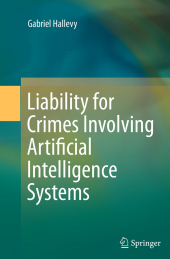 Neuerscheinungen 2016Stand: 2020-02-01 |
Schnellsuche
ISBN/Stichwort/Autor
|
Herderstra▀e 10
10625 Berlin
Tel.: 030 315 714 16
Fax 030 315 714 14
info@buchspektrum.de |

Gabriel Hallevy
Liability for Crimes Involving Artificial Intelligence Systems
Softcover reprint of the original 1st ed. 2015. 2016. viii, 257 S. 235 mm
Verlag/Jahr: SPRINGER, BERLIN; SPRINGER INTERNATIONAL PUBLISHING 2016
ISBN: 3-319-36176-7 (3319361767)
Neue ISBN: 978-3-319-36176-5 (9783319361765)
Preis und Lieferzeit: Bitte klicken
The book develops a general legal theory concerning the liability for offenses involving artificial intelligence systems. The involvement of the artificial intelligence systems in these offenses may be as perpetrators, accomplices or mere instruments. The general legal theory proposed in this book is based on the current criminal law in most modern legal systems.
In most modern countries, unmanned vehicles, sophisticated surgical systems, industrial computing systems, trading algorithms and other artificial intelligence systems are commonly used for both industrial and personal purposes. The question of legal liability arises when something goes wrong, e.g. the unmanned vehicle is involved in a car accident, the surgical system is involved in a surgical error or the trading algorithm is involved in fraud, etc. Who is to be held liable for these offenses: the manufacturer, the programmer, the user, or, perhaps, the artificial intelligence system itself?
The concept of liability for crimes involving artificial intelligence systems has not yet been widely researched. Advanced technologies are forcing society to face new challenges, both technical and legal. The idea of liability in the specific context of artificial intelligence systems is one such challenge that should be thoroughly explored.
Chapter 1 - Artificial Intelligence Technology and Modern Technological Delinquency.- Chapter 2 - Basic Requirements of Modern Criminal Liability.- Chapter 3 - External Element Involving Artificial Intelligence Systems.- Chapter 4 - Positive Fault Element Involving Artificial Intelligence Systems.- Chapter 5 - Negative Fault Elements and Artificial Intelligence Systems.- Chapter 6 - Punishability of Artificial Intelligence Technology.
"This pioneering work illustrates how emerging legal doctrines build on the past. ... anyone involved in the development of artificial intelligence will find profitable reading. ... The book carefully and logically moves into legally unknown territory. Over the next few years, given the accelerating advances in artificial intelligence, Hallevy┤s thoughtful analysis will doubtless be considered foundational. Readers will not be disappointed in his study." (Brad Reid, Computing Reviews, April, 2015)


